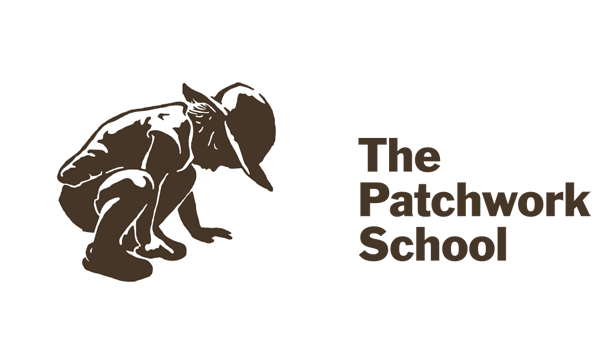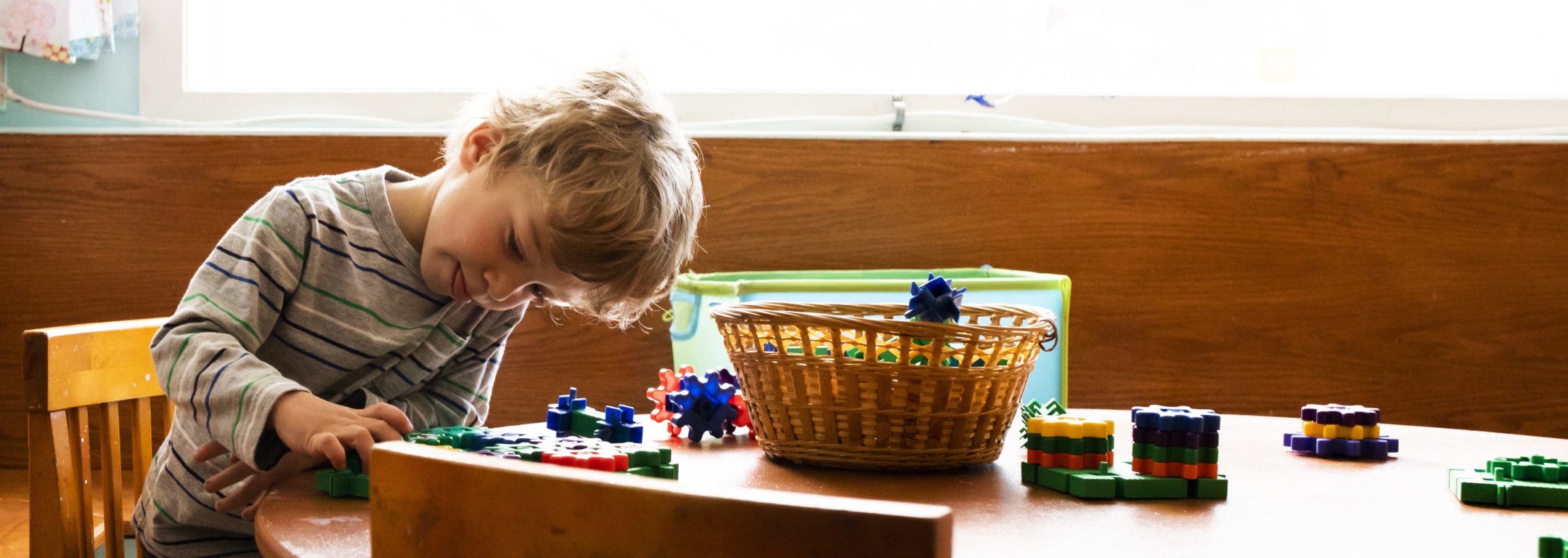Patchwork is: Recreating school, so children and adults learn through meaningful experience as citizens of a democratic community, advocating freedom, responsibility and compassion.
Our school is very different from most. Children at The Patchwork School spend their days engaged in hands-on, self-directed activities of their own choosing. They learn through play, and they work hard at it as they negotiate with children of various ages, learning how to communicate their feelings and needs. Teachers and students explore new ideas together through conversations, research, and trial and error. The community creates its own rules through group discussion and consensus building, while each person learns how to lead and how to listen. We learn to take care of one another and our world with kindness and compassion. We teach people how to stand up for themselves and one another other. Ultimately “Patchwork” means we have woven together various philosophies to meet the children and the community where we are at. It also means that each day we work to “patch” things together within this unique organization so we can live and learn together.
We believe that children must have freedom in order to learn and that learning is a natural process, so children are always allowed to choose if they would like to participate. This means we must let go of our stories of what school “should” look like so that we can meet each child exactly where they are.
We also believe that with freedom comes responsibility for oneself and to one’s community, so that it is not a “free-for-all” but that children learn how to respond to others’ limits as well as the limits of their environment. Children are also included in creating limits and holding one another to their agreements.
We believe in teaching and modeling compassion so that children learn how to lead, how to listen, and how to transform conflict through the use of non-violent communication. These are essential skills for this 21st century world.
Drawing from multiple approaches allows us to organically move through the meaningful experiences that arise naturally each day. Standing on the shoulders of many educators that have come before us, our philosophy is inspired by Reggio Emilia, Humane Education, and Democratic Education as well as various components of Waldorf, Montessori and others.
Translating all of that theory into practice, we think of doing this in two primary ways – through our Emergent Curriculum, which is the process of learning about our world together, and our Social Emotional Learning Approach, which is how we learn to be people in community.
My son has blossomed since he started at Patchwork. He has learned how to express himself constructively, and confront conflict with kindness and understanding. The teachers have assisted and encouraged his interests in learning his letters and numbers, even at a very early age. He has also been exposed to science and natural things in creative ways that I could never have done by myself at home with him. I am confident that Patchwork is giving him a firm foundation on which he will build his education for many years to come.
Parent
Frequently Asked Questions
How do you assess what children know?
We get to know them very well, through observation, through conversations with the families, and by building relationships.
Will they learn to read and write and do math?
Yes! When we value the “life of the mind” and we expose children to it, they eventually pick it up, just as they learn to walk and talk. Often they pick it up more quickly than when we try to make them sit down to be taught!
How do you promote learning in this philosophy?
Learning happens all the time! At Patchwork we encourage it in a multitude of ways – through peer interactions and relationships, through provocations set out by teachers, via offerings hosted by students, teachers and community members, and by allowing students time to observe and experience life!
Can a fluid and organic approach be chaotic at times?
We don’t consider chaos to necessarily be a bad thing. Sometimes life is chaotic and messy, and we prefer to acknowledge that fact and learn tools for how to manage stress rather than pretending it doesn’t exist. Also, we would rather have a fluid environment that does allow for hectic moments than attempting to control every moment by having people unnecessarily stand in lines or have to wait until everyone is finished.
What happens if they transition to another type of environment?
Everyone leaves Patchwork eventually, and we recognize that regardless of where they go there will be differences. We work with the children and the family to acknowledge the transition, helping everyone to prepare for what may lie ahead. Research and experience has shown that this type of philosophy develops resourcefulness, confidence, and excellent communication skills that help the child adapt easily to any new challenge that comes their way.
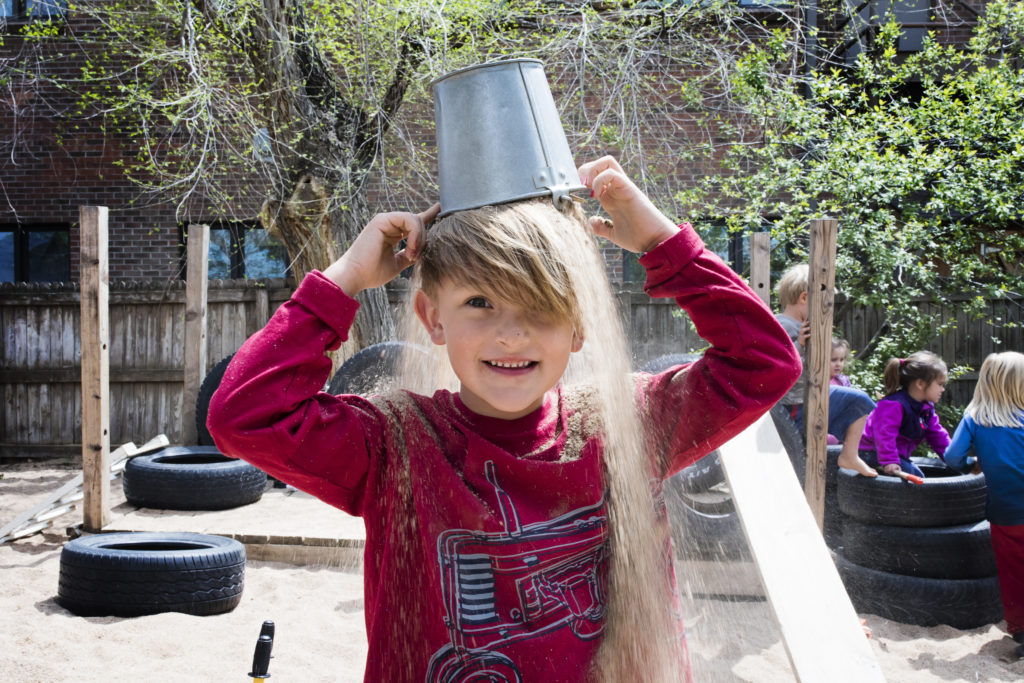
Freedom
When we use the term “freedom”, we are referring to the right that every person has to think, act and feel the way they prefer. We want everyone to be free from the expectations that society places upon us based on our gender, race, class, age or any other status quo. We are not saying that a person, at every stage of life, should always be allowed to do exactly what they want, but rather that freedom should be preserved in accordance with a person’s development. A 3 year old, for example, should not have freedom of choice regarding whether he or she sits in a car seat because that is not a freedom they would handle appropriately at their current stage of development. However, the same 3 year old could handle (with relative ease) the freedom to choose what to do with an unscheduled block of time. They might draw, play with trains, talk to a friend, read a book or sit quietly, each of which could be exactly what that individual child needed in that moment.
Why is freedom important? Because without it we are unable to develop an inner compass. When we are allowed to be free, we are afforded the opportunity to look closely at ourselves and to self-actualize (be who we truly are). When we create a free environment like the one at Patchwork, we are saying that we create a space for children to learn to trust themselves. We offer them freedom because we want them to practice choosing how to spend time within a safe, supportive environment. In essence, we want them to practice being free as a child before they are free as an adult. As adults, we often don’t know what to do with our freedom, because for the first 18 years of our lives, it wasn’t a regular part of our reality. Learning how to navigate one’s life early and often sets the groundwork for a confident and centered adulthood, reducing the likelihood that one will spend early adulthood trying to “find themselves.”
Joy is often found in free play, the natural work of children, so children will be found playing all throughout the day, and will likely say that they just played all day. We believe this is a good thing, as learning doesn’t have to be painful.
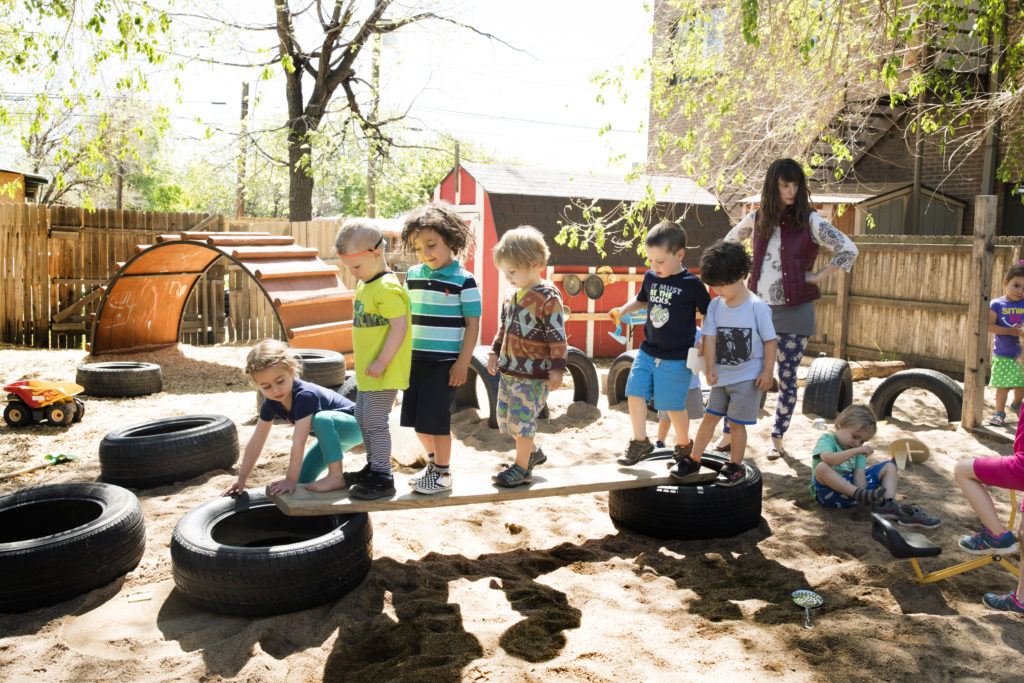
Responsibility
It is important to clarify that the free environment we create for children is within the context of our school community. This means that there is a big difference between being “free” and having a “free for all”. Because we balance freedom with responsibility to the community, my rights must be checked when they start to infringe upon yours. Another way to say this is that we provide the children with a strong “container.” This allows children to feel the natural limits that are present within a community. The container is present for any age group, but as a child grows within Patchwork they become better at noticing when they are bumping up against the edges of the container without needing as much support from their community.
Responsibility also means taking ownership for one’s feelings, needs, behaviors and actions. A child may not consciously knock over another child’s tower, and thus it can be helpful to have support in considering one’s intention and at the same time taking responsibility for one’s impact. Ultimately, this provides the awareness necessary for compassionate communication and conflict transformation.
People who can trust their hearts and take responsibility for their choices are the same people who will take action when it matters. Regardless of age, a person can be an agent for change in the world, allowing them to be a citizen, or a true, engaged member of a community.
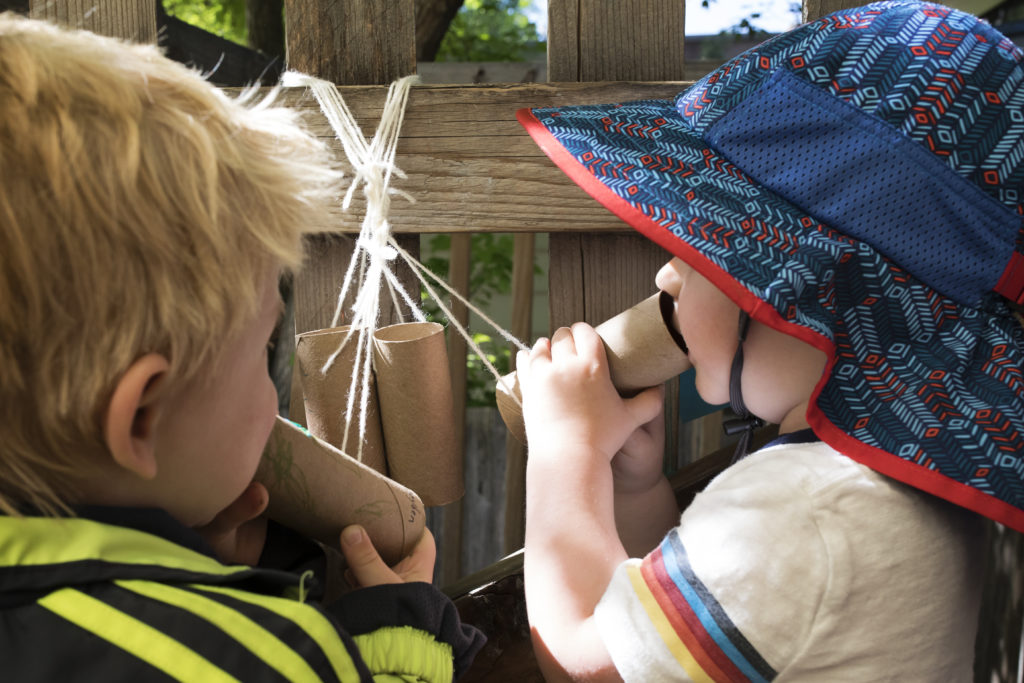
Compassion
Much has been written about the importance of being kind to each other and in some ways it is just that. Also, at the heart of compassion is learning about our perceptions of ourselves and others. We encourage children, through modeling and scaffolding, to consider each other’s point of view or do what is known as “perspective sharing”. Through the practice of listening to each other and being heard, we watch as children become more and more skilled at caring communication, laying the groundwork for a life of compassionate interaction with others.
We also want children to have real experiences that provide opportunities to feel compassion for animals and other living things, such as our school’s plants and animals in our garden and farm.
What we need in the world are conscious humans who are accustomed to asking hard questions and taking a stand when things do not seem quite right. We need innovative thinkers but more than that, we need people who can trust their hearts and have cultivated their ability to think for themselves.
Meaningful Experiences
Offeirng meaningful experiences means that we try to have “nothing out of context,” meaning we do not teach the letter R on Tuesday just because it is letter R day. Instead, we write Ryan’s name on the white board during morning meeting because he has an idea to share with the group, and thus end up modeling (in context) the usefulness of the letter R. Imposing arbitrary constraints on learning only serves to hamper the natural process of learning. Since we know that children are wired to learn, we trust that they will encounter knowledge (like the letter R) when it is meaningful to them and within context.
When we are directed by our inner compass we find meaning in what we are doing. To say that we “find meaning” in something is to say that we feel a certain truth in our experience. When someone else creates an experience for us we can feel the truth that might exist for them, but when we create our own experience of the world, we feel the truth that exists for us. We are able to say, “That felt right; that felt meaningful to me.”
Reggio Emilia
Reggio Emilia is an approach to education which began post-WWII in Reggio Emilia, Italy, when a group of mothers decided they wanted an education for their children that would allow the children to think for themselves. What emerged from their efforts has become an inspiration to early-childhood educators around the world, including those of us here at The Patchwork School.
In Reggio Emilia, an image of the child as a competent and capable contributor to the community is held by all. Children are viewed as having many “languages” in which they communicate their understanding of their world, so there is great emphasis on symbolic representation in the learning process. Curriculum in Reggio Emilia, just as in Democratic Education, is emergent, meaning that it arises from the interests of the members of the community. There is a strong belief in the power of group-learning for children, as well as the wisdom of co-teaching, where teachers always have one or more peers with which to share ideas and questions about the children’s interests and process. Check out our Emergent Curriculum page for more details.
Humane Education
Humane Education is an approach to education that is primarily concerned with each person’s awareness of humanity and our collective impact on the world. We exist in relationship to each other, to animals and to the world, so we nurture kindness and compassion in our children and ourselves. From the Institute for Humane Education:
Humane education includes 4 elements:
- Providing accurate information about the issues of our time so that people have the information they need to understand the consequences of their decisions as citizens.
- Fostering curiosity, creativity and critical thinking so people can evaluate information and solve problems.
- Instilling reverence, respect and responsibility so people have the motivation to face challenges and to act with integrity.
- Offering positive choices that benefit oneself, other people, the animals, and the Earth, and tools for problem solving so that people are empowered to create a more humane world.
Democratic Education
Democratic Education is the term used to describe an approach to education where every individual is actively engaged in the learning process. Rather than passively receiving information, children and teachers in democratic schools act as co-constructors of knowledge, working together to build an understanding of the world, fueled by their interests. There is a strong emphasis on self-regulation and the importance of owning one’s experience of the world. Additionally, there is an understanding in democratic education that emotional and social health are of utmost importance. We cannot attend to children’s minds unless we first attend to their hearts. “Democratic Education is an education grounded in meaning, relevancy, joy, community, love and human rights,” as defined by the Institute for Democratic Education in America (IDEA).
I want to express how grateful we are to have found The Patchwork School. We’ve been to a number of public and private schools and this is the first school where the teachers truly understand and respect my daughter and where she actually has a voice in her education. The Democratic Education philosophy is teaching her that it’s okay to state her feelings and in fact, this is actually encouraged. She is now calling meetings at home and with other family members and starts the meeting with an I Feel Statement. This is a powerful tool for conflict resolution that I know will benefit her during her lifetime. She is finally thriving in a compassionate environment that respects each child’s individuality, trusts that children can make important decisions and holds each child accountable for their actions. Your staff is excellent, well trained and clearly love what they do. Thank you for building such a progressive school.
Parent
